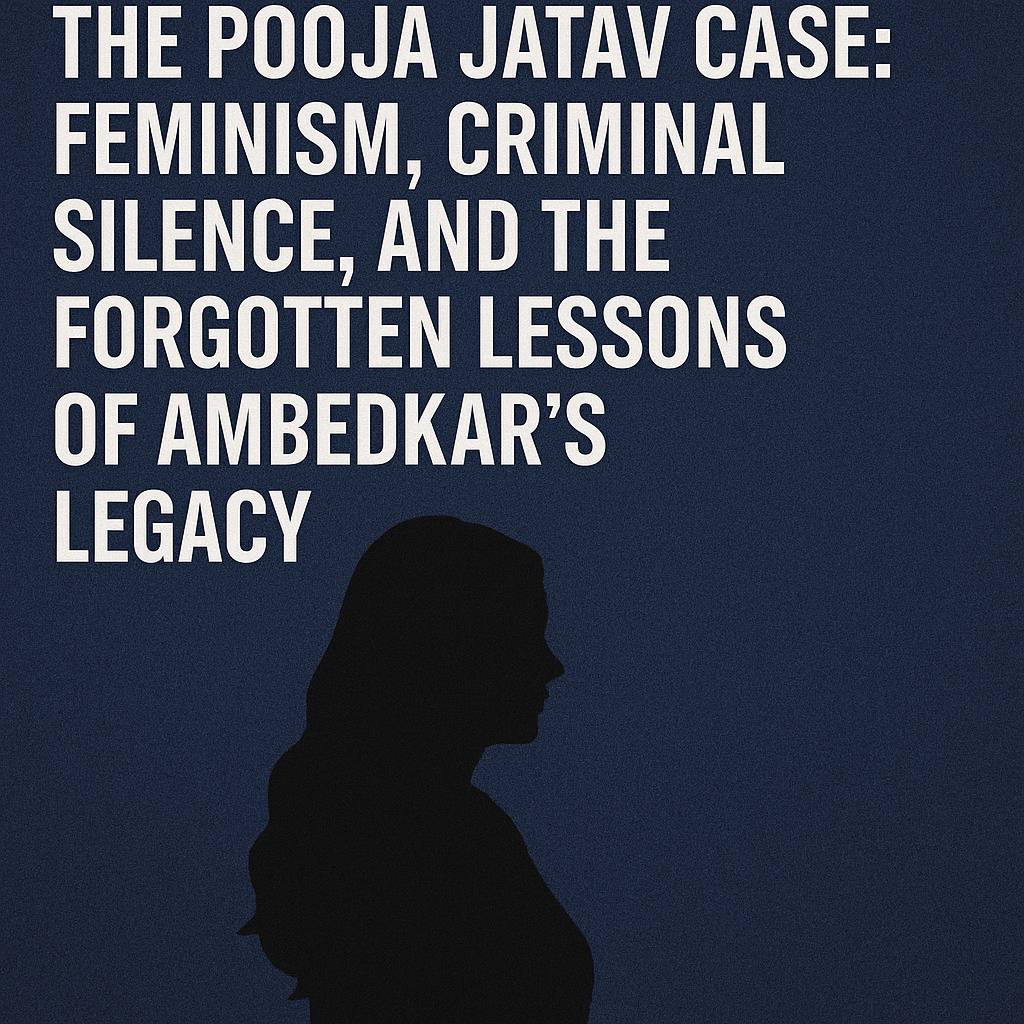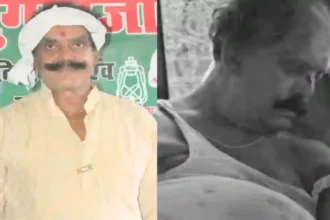
What happens when the law intended to protect is manipulated to oppress? What if feminism becomes a cover for serial abuse rather than a shield from it? The chilling case of Pooja Jatav a woman accused of serial manipulation, suspicious deaths, and alleged land grabs has stirred national outrage. But what’s more disturbing than the allegations themselves is how long it took for justice to catch up with her.
- Case of Pooja Jatav: A Timeline of Allegations and Death
- Early Marriage and Domestic Violence Allegations
- Love Found in Court or Target Identified?
- Mysterious Death of Second Husband
- Entering a Relationship with the Deceased’s Brother
- Murder Allegation: The Mother-in-Law
- Inappropriate Ties with Father-in-Law?
- Legal Loopholes, Delayed Arrest, and the Power of Silence
- When Feminism Becomes Immunity
- What Would Ambedkar Say?
- Ambedkar’s Own Contradictions: A Note on Ramabai
- Gendered Laws Need Gender-Neutral Justice
- Final Thoughts: The Balance We’ve Forgotten
In a society where feminism is often interpreted through the lens of victimhood alone, the Pooja Jatav case forces a re-examination. Can women misuse power and evade scrutiny? Where is the line between justice and selective silence?
This article unpacks the case in detail, explores its implications for modern feminism, and turns to B.R. Ambedkar’s feminist legacy not to glorify, but to critique and contextualize. In the end, it asks a brutal question: What happens when feminist systems forget moral accountability?
Case of Pooja Jatav: A Timeline of Allegations and Death
Early Marriage and Domestic Violence Allegations
Pooja Jatav was first married into a lower middle class household in Madhya Pradesh. Within months, she filed a domestic violence case against her husband and in-laws. While the details of the case remain unclear, her husband claimed he was falsely accused. The marriage dissolved under legal stress.
Love Found in Court or Target Identified?
It was in court during her domestic violence hearings that she met Kalyan Jatav, a man who was offering support to another litigant. Soon, she married him. Her critics argue that her pattern was not of victimhood but of calculated proximity to vulnerable families.
Mysterious Death of Second Husband
Kalyan Jatav died under suspicious circumstances six years into their marriage. Police documents cite unclear causes and unexplained injuries. Though no charges were initially filed, rumors of foul play and inheritance related motives began circulating.
Entering a Relationship with the Deceased’s Brother
Following Kalyan’s death, Pooja began a live-in relationship with Santosh Jatav, Kalyan’s elder brother. This raised eyebrows in the village and prompted widespread suspicion. The brother reportedly had no objection — until his mother went missing.
Murder Allegation: The Mother-in-Law
Pooja’s mother-in-law had allegedly opposed handing over the family’s 18 bigha of land to her. Soon, she was found dead in the family home. Suspicion again fell on Pooja. Though no witness came forward, police hinted at her involvement.
For years, the case remained buried under procedural inertia.
Inappropriate Ties with Father-in-Law?
Police sources leaked an internal inquiry suggesting Pooja had an inappropriate relationship with her father-in-law, possibly as a coercive control mechanism. No formal charges were filed — but the family’s silence was deafening.
Legal Loopholes, Delayed Arrest, and the Power of Silence
Despite multiple deaths and rumors of manipulation, it took nearly a decade for law enforcement to act. Only after local media raised consistent alarms and civil society groups pushed for accountability was she finally arrested.
So why the delay?
- Gender bias in reverse: Police often hesitate to pursue female suspects in domestic cases.
- Lack of forensic investment in rural deaths.
- Cultural narratives of female innocence.
This isn’t just a case of crime. It’s a case of institutional paralysis — and selective silence protected by a weaponized narrative of feminism.
When Feminism Becomes Immunity
- Feminism is about rights — but also responsibilities.
- Yet, the contemporary version of feminism in many circles treats women as inherently non-criminal, always the victims, never the perpetrators. This has resulted in:
- Misuse of domestic violence laws (e.g. Section 498A IPC)
- Manipulative litigation in family courts
- False dowry or harassment accusations that destroy innocent men’s lives
- The Pooja Jatav case is not isolated. It echoes countless cases across India where the system is slow to accept that women can commit heinous crimes too.
- This does not mean that domestic violence isn’t real. It is — and deeply structural. But when the law becomes a tool for vendetta, it undermines real victims.
- This is not feminism. This is criminal immunity masquerading as empowerment.
What Would Ambedkar Say?
Dr. B.R. Ambedkar is remembered as the Chairman of drafting committee of Indian constitutiona and a fierce advocate for women’s rights. In his era, he argued:
“I measure the progress of a community by the degree of progress women have achieved.”
But Ambedkar also believed in social morality and the balance of justice. His work on the Hindu Code Bill sought to give women rights not unchecked power.He believed:
- Women must be equal partners, not passive property
- Legal protections must come with ethical obligations
- Revolutionaries must start with justice inside the home
If Ambedkar were alive today, he would likely be horrified to see feminism reduced to a shield against investigation, especially in cases like Pooja Jatav’s.
Ambedkar’s Own Contradictions: A Note on Ramabai
As we discuss feminism and accountability, it’s essential to remember Ramabai – Dr. Ambedkar’s first wife.
- She was married at the age of 9 to 15-year-old Ambedkar.
- She bore five children, four of whom died.
- She lived in poverty while Ambedkar studied abroad.
- She died at 37, mostly alone and in obscurity.
- Ambedkar went on to become a liberator of millions but did he liberate his own wife?
- This paradox matters because it reminds us that feminism must begin at home. Justice, if not personal, will always be incomplete.
Gendered Laws Need Gender-Neutral Justice
It’s time India asked the tough question: Should laws like 498A be gender-neutral? Should domestic violence statutes include women as abusers too? Should society stop pretending that women can’t lie, steal, manipulate, or kill?
The Pooja Jatav case is the mirror. And in that mirror, we see an uncomfortable reflection:
- A woman who manipulated an entire legal structure.
- A media ecosystem that tiptoed around the issue.
- A public too afraid to question because of fear of being labeled misogynist.
- Truth is not misogyny. Truth is justice.
Final Thoughts: The Balance We’ve Forgotten
Not every woman is a victim. Not every man is a perpetrator. Feminism must fight for justice not provide cover for crime.
The legacy of Ambedkar demands moral clarity. It demands that while we protect women from systemic oppression, we also hold women accountable when they become the oppressors.
Justice delayed is justice denied regardless of gender.
And to those who say, “Caste and past don’t matter,” we say:
“Past always matters. And sometimes, that past comes back not to haunt you — but to erase you.”
Stay tuned with The News Drill for more updates.
📩 Contact us: contact@thenewsdrill.com
📝 Submit a tip or story: editor@thenewsdrill.com
Follow us on X: @TheNewsDrill
















